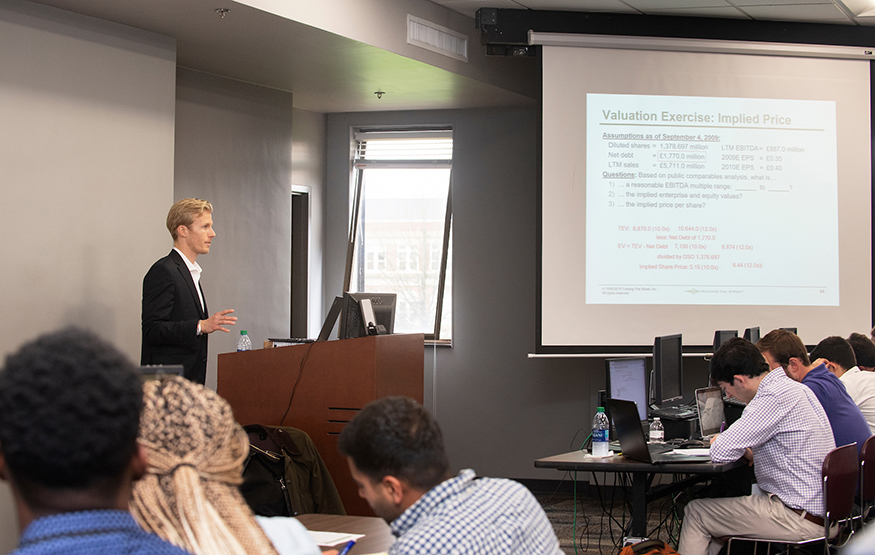
Contact: James Carskadon
STARKVILLE, Miss.—Approximately three dozen students in Mississippi State’s College of Business recently spent two days learning the skills to make them successful at the highest levels of finance.
The Department of Finance and Economics brought “Training the Street” to Starkville to conduct the same acclaimed financial training they give to investment banks, consulting firms, Fortune 500 companies and the world’s leading universities. Mike Highfield, professor of finance and Robert W. Warren Chair of Real Estate Finance, said the training complements the fundamental aspects of financial modeling and valuation students learn in the classroom by working through real world examples.
Training the Street was recommended to Highfield by a College of Business graduate who currently works at Barclays in New York City. The alumnus went through the program while pursuing a master’s degree at Vanderbilt University and said it helped prepare him for working at a Wall Street firm. During the training this month at MSU, students studied the valuations that went into the 2010 Kraft Foods acquisition of Cadbury.
“It’s nice to have someone who has done these transactions on Wall Street to show students how these transactions are modeled and come together,” Highfield said. “We just view this as a value-added experience for our students. Most universities don’t provide their students with a hands-on opportunity like this.”
MSU’s Training the Street session was led by Zachary Beukema, a Boston College graduate with experience at Raytheon Company and Jeffries LLC Investment Baking in New York, where he spent three years as an investment banking analyst within the media and telecommunications group.
Beukema said he looks to show academic concepts through the lens of a practitioner, giving real-world examples of things students may encounter in their jobs.
“When I’m teaching at a school instead of for a corporate client, the main thing I’m trying to do is prepare them for interviews, prepare them for on-the-job success and show them what to be mindful of,” Beukema said. “It makes them not only prepared for interviews, but prepared to succeed on their job and stand out and perform better than their peers. We do this same training at investment banks.”
Highfield said MSU finance and economics faculty want their graduates to have the tools to be competitive for the jobs of their choice, whether they plan to use their knowledge to improve life in Mississippi or work in the highest levels of finance around the globe.
“Training the Street is an example of MSU exposing students to a very practical side of finance,” Highfield said. “If a student’s goal is to go to New York City and work on Wall Street, we want to give them the opportunity to get the information and training they need to be successful.”
MSU’s College of Business and Department of Finance and Economics funded the Training the Street program, so students could participate at no cost. For more information on Training the Street, visit www.trainingthestreet.com.
For more on MSU’s College of Business, visit www.business.msstate.edu.
MSU is Mississippi’s leading university, available online at www.msstate.edu.